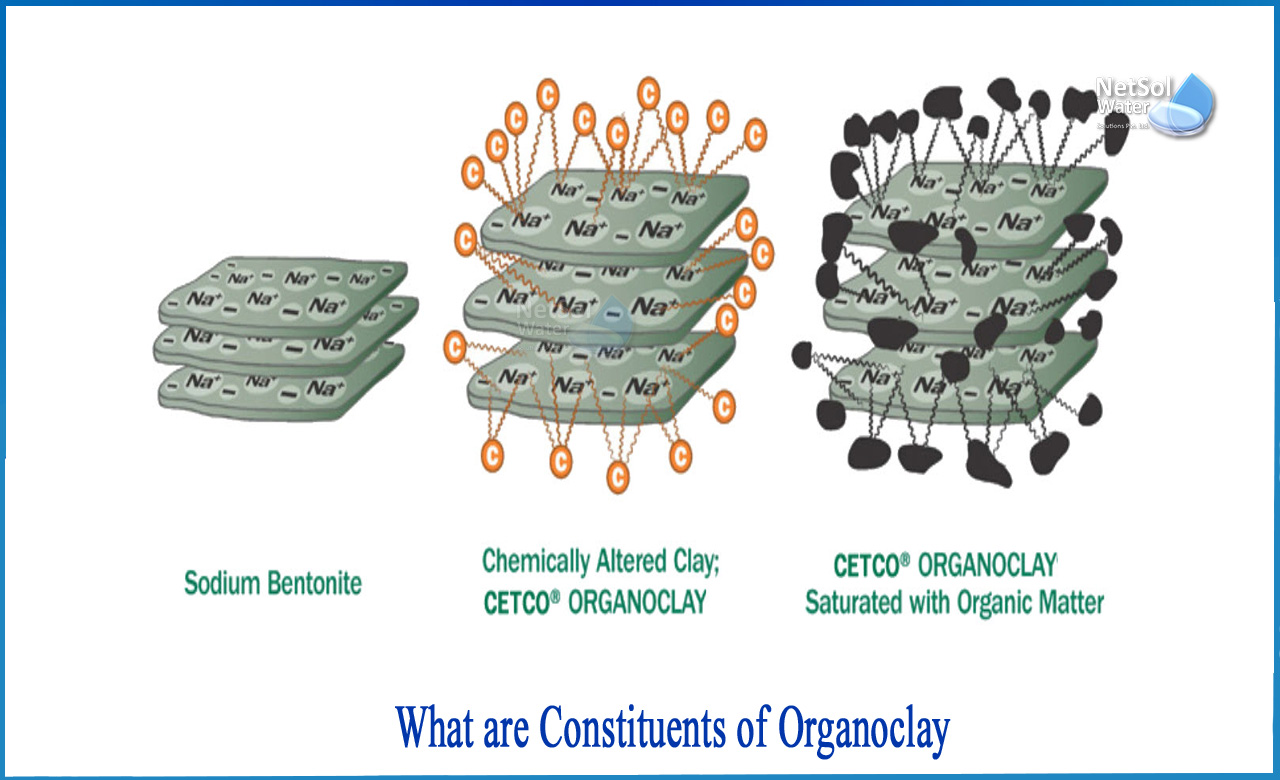What are constituents of Organoclay?
Organoclay is a naturally occurring clay mineral that has been organically modified into a phyllosilicate. By exchanging the original interlayer cations for organocations (typically quaternary alkylammonium ions), an organophilic surface composed of covalently linked organic moieties is formed. The lamellar structure is identical to that of the parent phyllosilicate.
What are organoclays used for?
Organoclay can be used to remove oil from water due to its large surface area and hydrophobic chains that emerge from the clay surface. It is also used in paint formulations and as a viscosifier in oil-based drilling fluids. It can be used as a nucleating agent in polymer chemistry.
When organoclay is mixed with water, chemical reactions occur that allow the clay to dissolve hydrocarbons, which are organic chemicals made up of hydrogen and carbon, such as oil. This is due to the presence of amines, or ammonium compounds, which were added to the clay during the manufacturing process. It functions as a surfactant, lowering liquid surface tension and allowing them to mix with previously incompatible substances. Because of these chemical properties, oil cannot dissolve in water but can dissolve in clay.
Organoclay is also used to treat groundwater. For example, when water leaches through a landfill or becomes contaminated on a construction site, allowing that water to return to the groundwater without treatment is often hazardous to the environment. In these environments, organoclay is used for remediation projects.
One type of technology used to treat groundwater near landfills is the permeable barrier. Organoclay is used to build a barrier around the problem area. Because the clay is porous, water can seep through the barrier and back into the groundwater. The chemical properties of the clay, on the other hand, trap and dissolve organic compounds and pollutants. The barrier keeps contaminants out while allowing pure water to return to the environment.
What are the applications?
Certain types of organoclay have applications outside of the field of water treatment. Organoclay additives can be used to reinforce plastics, including plastic bags. When certain clay mixtures are added during the manufacturing process, they have been found to increase the strength and flame-retardant properties of plastics.
Organoclays also allow a formulator to incorporate unique rheological properties into a wide range of products in order to meet stringent consumer preferences. Although the demand for organoclay-based thixotropies has declined in recent years, the clays are still widely used in nail lacquer, antiperspirant, color-cosmetic, and skin-care products "providing crucial thixotropic flow properties (Thixotropies set on standing, thin out when stirred, and then re-set after the movement stops.)
Conclusion
Organoclays are also used in the oil industry as additives in fluids used for well drilling and enhanced oil recovery. Organoclays are to animal feeds to remove harmful mycotoxins, thereby accelerating livestock growth and improving overall animal health.
The application determines the level of performance required of an organoclay. A low-performance organoclay, for example, is frequently used in the production of traffic paints and drilling fluids. Organoclays are primarily used as anti-settling agents in traffic paints. The pigment suspension in the paints must be maintained during storage. Other factors, such as dispersion ease, flow properties, and gloss effects, are less important.
Netsol Water is Greater Noida-based leading water & wastewater treatment plant manufacturer. We are industry's most demanding company based on client review and work quality. We are known as best commercial RO plant manufacturers, industrial RO plant manufacturer, sewage treatment plant manufacturer, Water Softener Plant Manufacturers and effluent treatment plant manufacturers. Apart from this 24x7 customer support is our USP. Call on +91-9650608473, or write us at enquiry@netsolwater.com for any support, inquiry or product-purchase related query.



